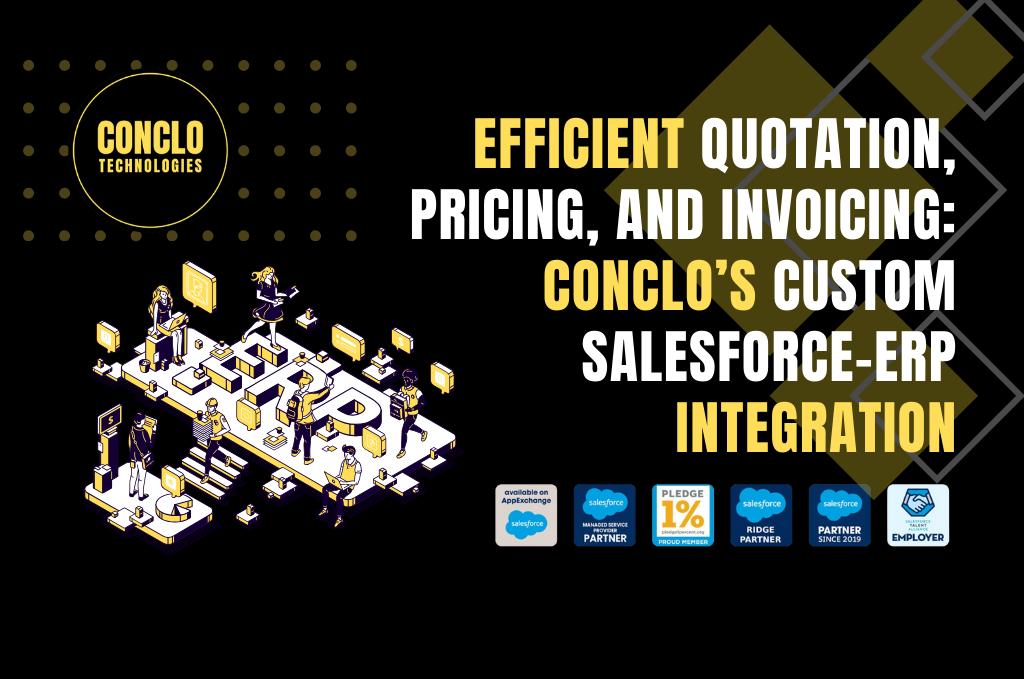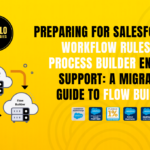In today’s fast-paced business world, streamlining processes and ensuring smooth data flow between systems is key to driving efficiency and improving customer satisfaction. When companies rely on multiple platforms to manage operations, inefficiencies can arise, leading to delays, errors, and operational bottlenecks. This is exactly what one of our clients was facing until CONCLO stepped in to help with a custom Salesforce-ERP integration solution.
Here’s a closer look at the problem, the solution we implemented, and the benefits our client achieved through this integration.
The Client’s Challenge: Disconnected Systems and Inefficiencies
Our client was using an in-house ERP (Enterprise Resource Planning) system to manage several business-critical operations, including invoicing and inventory management. While the ERP system worked well for these tasks, it lacked the functionality required for managing the custom products, complex pricing models, and quotations, which were handled in Salesforce.
The client’s business involved highly customized products, where prices were determined by the specific attributes selected during the quotation process. Salesforce, with its flexibility and powerful customization features, was well-suited for handling this complexity. However, there was one major problem: Salesforce and the ERP system were not integrated.
This lack of integration led to several challenges:
Manual data entry: Sales reps had to manually input data into both systems, increasing the risk of errors.
Data duplication: Customer, product, and quotation data were stored separately in Salesforce and ERP, creating redundant records and inconsistencies.
Delayed invoicing: Once a quotation was approved in Salesforce, there was no automated way to notify the ERP system to begin the invoicing process, leading to delays.
Discrepancies in reporting: Due to the disconnected systems, generating accurate reports for sales performance and financial reviews was a tedious process.
Ultimately, this siloed approach made it difficult for the sales and operations teams to work together efficiently, resulting in delays in invoicing, misaligned inventory management, and an overall lack of visibility into the sales process.
How Salesforce Became the Foundation for the Solution
Salesforce was already being used by the client to manage customer relationships, products, and the complex quotation process. Its ability to handle custom products and attribute-based pricing made it the perfect platform to act as the central hub for sales data.
But the missing piece was integration. To solve the client’s challenges, Salesforce needed to communicate seamlessly with the ERP system, allowing data to flow automatically between the two platforms.
Salesforce’s built-in integration capabilities, especially through REST APIs, made it the ideal solution for managing this synchronization. By building a custom integration, we could ensure that Salesforce became the master system for customer, product, and quotation data, and that this information was automatically shared with the ERP system when necessary.
CONCLO’s Custom Solution: Building a Seamless Salesforce-ERP Integration
At CONCLO Technologies, we designed and implemented a custom REST API integration that connected Salesforce with the client’s ERP system, allowing for real-time data synchronization. Here’s how the solution worked:
Synchronizing Customer, Product, and Quotation Data
Salesforce acted as the master system for three key data sets:
Customer Master: All customer information, from new records to updates, was stored in Salesforce and automatically synchronized with the ERP system.
Product Master: The client’s products were highly customized, and the specific product details, including pricing based on selected attributes, were managed in Salesforce. Once a product and quotation were approved, this information was pushed to the ERP system in real-time.
Quotation Details: Salesforce managed the entire quotation process, including custom pricing based on the product configuration. When a quote was approved, Salesforce triggered the synchronization of the quote and related delivery instructions with the ERP system.
Automated Data Synchronization on Quotation Approval
Once a sales quotation was approved in Salesforce, the integration automatically notified the ERP system, sending over all relevant details, including customer information, product configuration, and delivery schedules.
The ERP system used this data to manage inventory, ensuring that stock was available and properly allocated for the order, and began preparing the invoice. This automation eliminated manual data entry and minimized the risk of human error in the process.
Invoice Management and Payment Tracking
After the ERP system completed the invoice, it automatically shared the approved invoice with Salesforce. This integration allowed Salesforce to store the invoice data, where it could be sent as a PDF to the customer by sales representatives.
Additionally, payment tracking was managed in the ERP system. As payments were made, this data was synchronized with Salesforce, allowing sales reps to track payment statuses in real-time. This real-time visibility into both invoicing and payment information was critical for providing a complete view of the customer’s account.
Providing a 360-Degree View for Sales Representatives
The integration provided a comprehensive view of each customer’s journey—from initial quotation to invoicing and payment. Sales representatives could now easily access information about:
- The status of quotations
- Delivery schedules
- Invoice details and payment status
This real-time information allowed sales reps to offer better customer service and be more proactive in managing relationships.
Powerful Reporting in Salesforce
With Salesforce as the central hub for customer and sales data, the client could now generate detailed reports that drew from real-time information. Reports could be customized to track performance metrics, analyze quotation conversion rates, review invoice statuses, and monitor payment trends. These reports were invaluable for internal reviews and planning, providing insights into sales performance and operational efficiency.
The Benefits of Seamless Salesforce-ERP Integration
By implementing this custom Salesforce-ERP integration, our client achieved several important benefits:
- Improved Efficiency and Accuracy
The integration eliminated the need for manual data entry, reducing errors and speeding up processes. With real-time data synchronization, both the sales and operational teams could rely on accurate, up-to-date information.
- Faster Invoicing and Payment Processes
With approved quotes automatically triggering the invoicing process in the ERP system, the client saw significant improvements in the speed and accuracy of invoice generation. Payment tracking was also streamlined, giving the sales team real-time visibility into payment statuses.
- Better Customer Experience
Sales reps now had access to a 360-degree view of customer interactions, from initial quotes to invoicing and payments. This allowed them to provide more accurate information to customers, respond to inquiries faster, and offer a more personalized customer experience.
- Streamlined Reporting and Insights
With Salesforce as the master system for sales data, the client could generate detailed reports to track business performance. This allowed them to review sales performance on a daily, weekly, and monthly basis, ensuring they had the insights they needed to make data-driven decisions.
- 360-Degree Visibility for the Sales Team
The integration provided sales representatives with complete visibility into the entire sales process. They could see the status of quotes, invoices, and payments in real-time, empowering them to be more proactive in managing customer relationships and resolving issues quickly.
At CONCLO Technologies, we understand the importance of integrating business-critical systems to streamline processes and improve efficiency. For this client, we implemented a custom Salesforce-ERP integration that enabled seamless data flow between their sales and operations teams.
The result? Improved efficiency, reduced manual intervention, faster invoicing, and a better customer experience. With real-time data synchronization and comprehensive reporting capabilities, the client now has the tools they need to drive growth and success.
If your business is facing similar challenges, our team at CONCLO Technologies is here to help you unlock the full potential of your systems through custom integration solutions. Let’s work together to streamline your operations and take your business to the next level!



